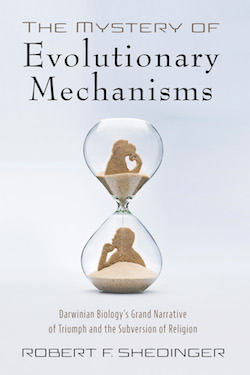 Evolution
Evolution
Have Religion Scholars Been Deceived by Darwin?


Editor’s note: Dr. Shedinger is a Professor of Religion at Luther College in Decorah, Iowa. He is the author of a new book critiquing Darwinian triumphalism, The Mystery of Evolutionary Mechanisms: Darwinian Biology’s Grand Narrative of Triumph and the Subversion of Religion, from which this post is adapted.
In a post yesterday I described developing a science and religion course at Luther College, where I teach. One thing that initially surprised me was the degree to which well-known religion scholars were willing to fully capitulate to Darwinian evolution and attempt to find ways to fit their religious reflections around it. Now that I understand the ideological nature of this grand narrative of Darwinian triumph and the force of its perpetuation in academic culture, I am no longer so surprised. These scholars must capitulate to Darwinism in order to be taken seriously within the academy where dissent from Darwinism brands one as an anti-scientific religious zealot not to be taken seriously. Yet in their rush to capitulate, these scholars end up subverting religion, the very topic of their academic work. Have these scholars been deceived by Darwin?
A “Theology of Nature”

On the relationship between religion on science, few scholars have been more influential than the late Ian Barbour, a physicist and theologian. In his 1997 book Religion and Science: Historical and Contemporary Issues, Barbour affirms his support for natural selection as the main driver of evolutionary change. This is confirmed when he cites industrial melanism in the peppered moth as direct empirical evidence of natural selection in action, seemingly unaware of all the problems with this example that have been known (though not widely publicized) since the 1960s. Barbour also takes issue with those who argue that extremely complex organs like the human eye could not have evolved through a Darwinian process and that appealing to the notion of a designer is nothing more than a god-of-the-gaps strategy.
Having thus established his Darwinian bona fides, Barbour is forced to abandon any traditional notion of God as creator and opts instead for a “theology of nature” that “includes some reformulation of traditional doctrines in the light of science.” Barbour’s capitulation to Darwinism actually subverts religion and influences others, including the influential Catholic theologian John Haught, to follow down the same road.
God after Darwin
In two books, God after Darwin (2000) and Deeper than Darwin (2003), Haught calls the Origin of Species “one of the most important works of science ever written,” accepting that “recent scientific expertise seems to confirm its explanatory power.” Given this, Haught is also forced to abandon traditional notions of a creator God, reconceiving God as a spirit that draws the universe forward into a future that is not divinely determined. He accepts the concept of contingency in evolution made popular by Stephen Jay Gould and, like Gould, is not certain that if the evolutionary story were rewound and played over again that humans would evolve. Yet despite this drastic reworking of traditional Christian theology, Haught is nevertheless convinced that a Darwinian view of evolution “answers to the deepest intuitions of religion,” and that Darwinian evolution forms the very foundation of a religious view of life. But I wonder if Haught has actually been deceived by Darwin.
More recently, Michael Ruse and Michael Peterson have coauthored Science, Evolution, and Religion: A Debate about Atheism and Theism (2017). We expect Ruse to defend an atheistic Darwinism, but we might be surprised at the lengths to which Peterson, an evangelical Protestant philosopher, goes in capitulating to Darwinism. He is willing to jettison ideas about divine control over creation and sides with Haught in viewing Darwin’s theory as forming a foundation for Christian theology. In his words, “…it is much wiser — and much more faithful to a classical theological perspective — to provide a positive philosophical interpretation of it (Darwinism).”
Science for Seminaries
These are just a few of the many examples of religion scholars who fully capitulate to Darwinism and seemingly subvert religion in the process. And this is no accident. I recently became aware of a new program being developed by the American Association for the Advancement of Science (AAAS) in collaboration with the Association of Theological Schools (ATS) called “Science for Seminaries.”
The stated purpose of this program is to help seminaries and theological schools bring world-class science into the theological classroom. The AAAS provides scientific experts who can talk about scientific issues in theological classrooms, and theology professors have access to articles providing the latest scientific findings on a variety of topics that they can build into their syllabi. The goal here is to develop a generation of scientifically literate priests and pastors. While this is not a bad goal, we know that if the AAAS is involved, theology students will never encounter experts or literature skeptical of Darwinism, thus getting a distorted picture of the relevant science.
All of these attempts to fit religious reflection around Darwinian evolution would be warranted if we could prove that Darwinian evolution is true. But if, as I argue, Darwinian theory is an ideological structure, not an empirically verified scientific theory, religion scholars should not be so quick to capitulate. Maybe religious reflection can have a positive, rather than just defensive, role to play in grappling with profound questions about life and meaning. In my next post, I will discuss some of the evidence for the ideological nature of Darwinian evolution as I have laid it out in more detail in The Mystery of Evolutionary Mechanisms.
Photo: A peppered moth, by Andy Phillips, via Flickr (cropped).
